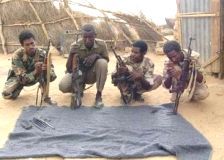East Sudan rebels report capturing government posts
KHARTOUM, June 20 (Reuters) – Eastern Sudanese rebels have captured three government garrisons south of Port Sudan and taken 10 prisoners, including an officer, an eastern opposition party spokesman said on Monday.

|
|
Beja rebels strip their rifles on a rocky hill near the Eritrean border town of Rubda June 4, 2005. (Reuters). |
Idriss Nour, spokesman of the Easten Front rebel movement based in Asmara, capital of Eritrea, told Reuters the fighting began on Sunday and was continuing on Monday.
“We took three government garrisons and are near Tokar,” he told Reuters by telephone. “We have 10 prisoners including one officer.”
Tokar is about 120 km (75 miles) south of Port Sudan on the Red Sea coast.
Sources in the Sudanese armed forces in Khartoum on Monday confirmed there had been fighting but would not give further details.
Nour said the Eastern Front, in a joint mission with a rebel group from Sudan’s western Darfur region the Justice and Equality Movement (JEM), had also seized arms and equipment from government forces including a Land Cruiser, five machineguns and rocket-propelled grenades.
Rebels from both the outlying western and eastern regions of Sudan have similar complaints against the central Khartoum government, of economic neglect and discrimination against them in favour of Arab tribes. They want more share in power and wealth.
The JEM is bound by a ceasefire signed with the government in April last year, and its leadership is currently in peace talks in the Nigerian capital Abuja. But the group has splintered many times and it is not clear whether the leadership has full control over forces on the ground.
In another joint mission last month, the rebels kidnapped three local politicians in the east.
Eastern Sudan is very poor and suffers from drought. The World Food Programme says that in some areas of the east, malnutrition rates are even higher than in the wartorn south or west of Africa’s largest country.
The east, containing Sudan’s only port, is vital to the nation’s budding oil industry. The main crude pipeline runs from Khartoum to Port Sudan and the government has accused the rebels of trying to sabotage it in the past. No major disruptions have occurred.
Sudan produces about 320,000 barrels per day (bpd) of crude and hopes to raise that to half a million bpd by August.
